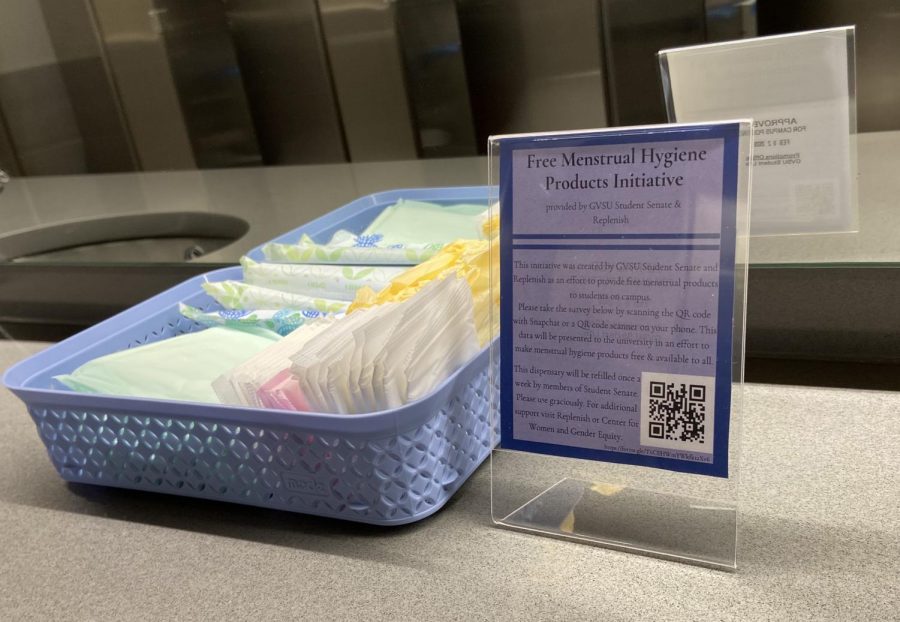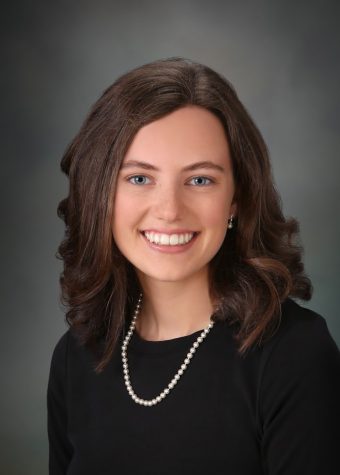Student spearheads menstrual supply distribution initiative
Oct 26, 2020
In January 2020, Grand Valley State University Student Senate began a new initiative in supplying select bathrooms and locations across the Allendale campus with free menstrual products for patron use. But was that enough to help higher education students who menstruate?
Alex Hicks, a GVSU student who was involved with the Student Senate at the time, has made this question the cornerstone of their senior project. Over the summer, Hicks conducted a survey of GVSU students and presented their research on access to menstrual products in higher education to a virtual audience Oct. 1.
The event was hosted by Sharalle Arnold, associate director of the GVSU Center for Women & Gender Equity, who introduced Hicks and Professor Laura Schneider, who worked with Hicks on their research.
During their presentation, Hicks shared that they were surprised by the universality of the need for menstrual products among GVSU students, regardless of factors such as gender identity, income or location.
“Regardless of socioeconomic status, regardless of gender identity, regardless of how important you think it is for this university to take this on or how often new work, which campus you’re on and how often you’re there — none of it really mattered,” Hicks said. “Everyone had this need and everyone had experienced it at some point.”
Hicks said that although this issue is so widespread, there is very little research on the impact it has on students in higher education.
“When I started the initiative to provide menstrual hygiene products in five bathrooms on our campus, I was looking at data and if there had been research about how this affects students in higher education, and there was no research like at all,” Hicks said. “So I decided to do that research myself.”
Hicks said that they have since resigned from their role in Student Senate and focused on their research and work with the Menstrual Health Task Force, which will deliver recommendations to the Dean of Students’ office by Dec. 15.
Emily First, student support director in the Dean of Student’s Office, is one member of the task force. According to First, the team is comprised of several students, faculty and staff from different departments and is chaired by Student Health Promotions Coordinator Katie Jourdan.
“Student Senate asked the leadership of the university to put a task force together to look at data, look at what other institutions are in doing, look at the cost, look at what is the need and if it would be used,” First said. “That’s what we have been charged with as a task force- —to look at those questions and then come back and make recommendations.”
Hicks said that after evaluating the data, they found that menstrual products could be supplied to GVSU students at a relatively low cost.
“When I really laid out the numbers for fall 2019, it would have only cost an additional $56 per female student per semester to provide free menstrual hygiene products,” Hicks said. “Then, if you split that between students who menstruate and students who don’t menstruate, it gets even lower.”
Hicks said that while other universities and colleges in the U.S. have attempted to run similar initiatives, GVSU has the potential to be among the first to do so successfully.
“A lot of what we were looking at over the summer was what our peer institutions are doing, and there’s not a ton,” First said. “There are definitely schools out there doing some really cool stuff, but a lot of them are very much student-led or student organization-run programs versus a university initiative.”
First said that she is excited and optimistic about seeing the university’s response to the recommendations this winter.
“What’s exciting to me is to see how the university responds to these recommendations,” First said. “I’m excited that they were willing to take the recommendations of the Senate and push this forward into looking into what could be done.”
Hicks said that they are happy to see their research spark important conversations and hope to expand the product further in the near future. They hope to see higher quality products supplied to gender-neutral restrooms as well.
“To me, this was always an interesting topic, but seeing it be interesting to other people is something I really love, especially because it’s such a taboo topic and sometimes beginning that conversation is pretty uncomfortable,” Hicks said. “I felt like this was never something I like really talk openly about and to see that all of our experiences are really universal and common has been really empowering.”























